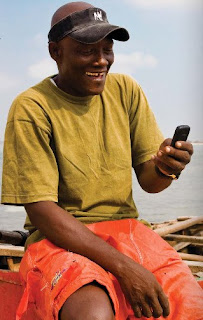In 2001, Africa became the first continent where the number of mobile subscribers exceed fixed line users. With almost 280 million customers, Africa is now the fastest-growing market in the world. Analysts estimated that by 2010, a third of Africans will own a mobile phone. This trend is definitely bearing out in Angola, where it is calculated that there are as many mobile phones in the country as adults!
In all the areas of infrastructure rebuilding, the telecommunications / mobile phone industry has been one of the success stories. Since the licencing of mobile phone operators in 2000, the market has boomed to add some 8 million subscribers. Mobile phone usage has experienced this amazing growth because of the real need; the ending of the three-decade war left a precarious traditional communications infrastructure with only about 200,000 working landlines.
More than just a technical toy, mobile phones are so important in the developing world in fact, that they have been hailed as one of the best ways to improve livelihoods. A study by the London Business School concluded that an increase in mobile phone penetration by 10% leads to an increase in GDP by 0.6%. If this can be applied to Angola's burgeoning economy, this will be a welcome boost.
Mobile phone are now being used in Angola in very ingenious ways. For example, in the very isolated, rural southern areas of Angola, the mobile phone is being used as an important weapon in the war against the spread of the HIV infection. It is common for a phone's young owner in these areas to recieve a text message that reads, "Life is stronger that AIDS. Get an HIV test!"
This campaign, initiated by the INLS (Angolan National Institute for the Fight Against Aids), realizes that text messages are great way to raise awareness, combat the stigma against the disease and provide information on the treatment since text messages are direct and personal, yet do not infringe on people's privacy.
In another unique usage of mobile phone telecommunications, last year during the general election, Angolan phone users could text their voter registration number to a central number, which would send back a text informing them of the nearest polling station. This potentially saved many days of travel from isolated areas on many unimproved roads. (Info Adapted from Sonangol Universo Magazine)


No comments:
Post a Comment